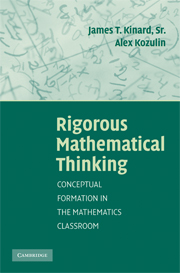Book contents
- Frontmatter
- Contents
- Introduction
- 1 Culture of Mathematics
- 2 Goals and Objectives of Mathematics Education
- 3 Vygotsky's Sociocultural Theory and Mathematics Learning
- 4 Mediated Learning and Cognitive Functions
- 5 Mathematical Concept Formation and Cognitive Tools
- 6 RMT Application, Assessment, and Evaluation
- Conclusion
- References
- Index
Introduction
Published online by Cambridge University Press: 05 June 2012
- Frontmatter
- Contents
- Introduction
- 1 Culture of Mathematics
- 2 Goals and Objectives of Mathematics Education
- 3 Vygotsky's Sociocultural Theory and Mathematics Learning
- 4 Mediated Learning and Cognitive Functions
- 5 Mathematical Concept Formation and Cognitive Tools
- 6 RMT Application, Assessment, and Evaluation
- Conclusion
- References
- Index
Summary
“There are 26 sheep and 10 goats on a ship. How old is the ship's captain?” This and similar tasks were given during the math lessons to primary school students in a number of European countries. More than 60% of students attempted to solve the problem by combining the given numbers, for example, by adding the number of sheep and the number of goats (Verschaffel, 1999). In our opinion, students' handling of the “Captain” problem is emblematic of the difficulties experienced by many students in the math classrooms because it clearly demonstrates that the students' main difficulty was not with mathematical knowledge but with more general cognitive functions that form prerequisites of mathematical reasoning. Students who blindly started to apply mathematical operations to the numbers given in the task ignored a host of cognitive operations that are needed for any sensible problem solving. They neither oriented themselves in the given data, nor compared or classified it. They also did not formulate the problem presented in this task, most probably because no one taught them the difference between the question (“How old…”) and the task's real problem. They apparently were not used to thinking of the tasks as having one solution or several or an unlimited number of correct solutions or no solution at all. For them, mathematics apparently appeared as an associative game where the winner correctly guesses which standard operation fits which one of the standard tasks.
Information
- Type
- Chapter
- Information
- Rigorous Mathematical ThinkingConceptual Formation in the Mathematics Classroom, pp. 1 - 15Publisher: Cambridge University PressPrint publication year: 2008
